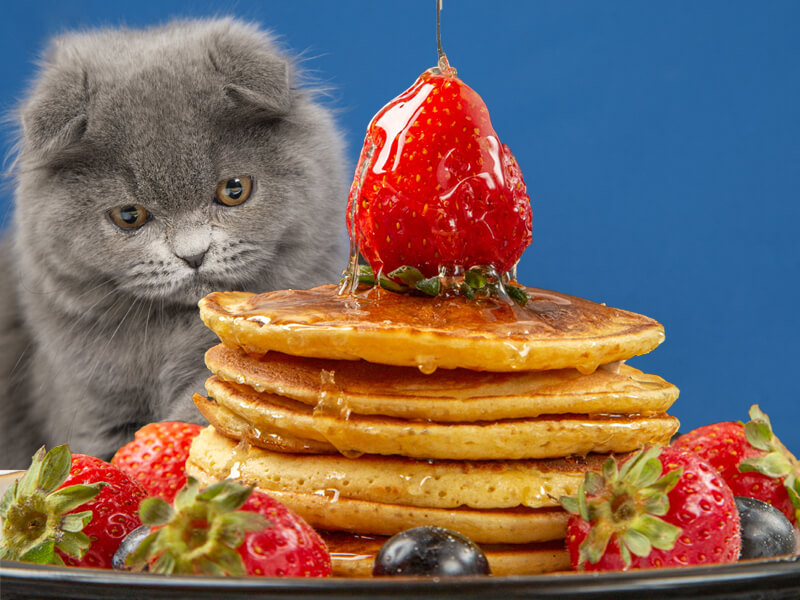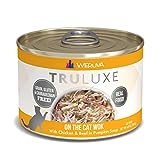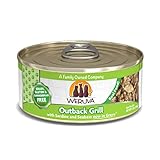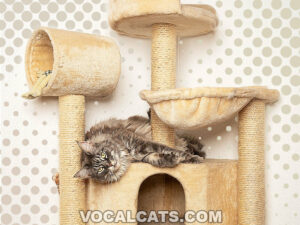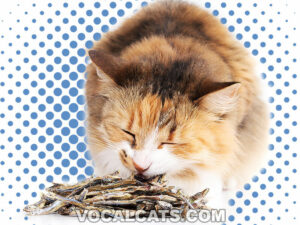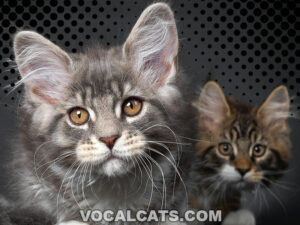Can Cats Eat Pancakes? No, cats should not eat Pancakes because of their high sugar content which could only cause obesity, dental problems, and cardiovascular disease. And since our cats are lactose-intolerant, their digestive systems are not designed to break down dairy products which can cause gastrointestinal disorders like diarrhea.
The sweetness of Pancakes paired with the saltiness of bacon are two of my favorite breakfast combinations. Since Pancakes do not contain preservatives, you may ask, “Can I give a cat Pancakes?” Cats, being obligate carnivores, have very little requirements for carbohydrates like Pancakes.
To maximize our cats’ lifespan, it is healthier if they stick to consuming meat proteins rather than carbohydrate snacks like Pancakes and waffles. Today I will list down all the ingredients of Pancakes and why these are not great for your cat’s overall health.
RECOMMENDED: Can Cats Eat Rice Cakes?
Contents
- Can Cats Have Pancakes?
- What are Pancakes?
- What Are Pancakes Made Of?
- Are Pancakes Good For Cats?
- Are Pancakes Bad For Cats?
- So, Are Pancakes Ok For Cats?
- Are Pancakes Safe For Cats?
- Can Kittens Eat Pancakes?
- Cats And Pancakes
- What Human Food Can Cats Eat?
- Alternatives To Pancakes For Cats
- My Cat Ate Pancakes! What To Do If My Cat Ate Pancakes?
- So, Can Cats Eat Pancakes?
Can Cats Have Pancakes?
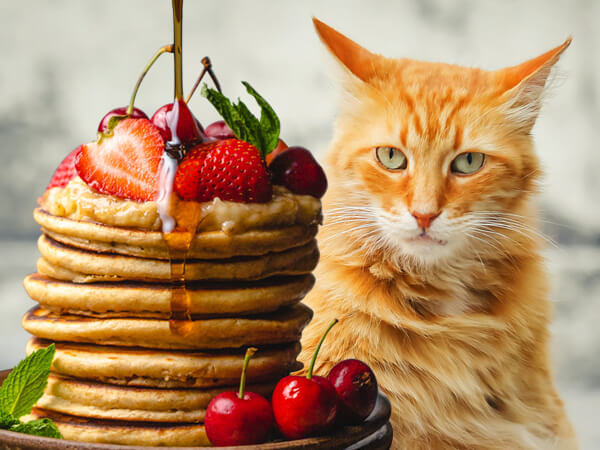
No, cats should not have Pancakes. Avoid giving Pancakes to your fur baby because this breakfast meal is sugary, made with milk, and loaded with carbohydrates.
I know some cat parents who share a tiny piece of Pancake with their cats and that’s fine. A bit of Pancake once in a while won’t harm our fur babies.
But, generally speaking, our cats are better off consuming food and cat treats that are made specifically for them, like the Weruva Truluxe Cat Food On The Cat Wok, which is high in meat protein and low in carbohydrates.
Going back to the Pancakes, let’s look at the nutritional profile of a 4-inch diameter or 38-gram of Pancake. There are many reasons why you shouldn’t share this food with your fur baby.
- First, the calories are just too high for your cat to consume. Cat treats should only comprise 10% of their total diet, so that’s about 25 calories each day. The problem is that 38 grams of Pancakes contain 86 calories. We know that excess calories equate to obesity.
- And if you think that Pancakes are devoid of salt, think again. As shown in the table below, a 38-gram Pancake has a high sodium level of 167 mg which is very bad for our fur babies.
- Pancakes are also high in fats, cholesterol, and carbohydrates which are detrimental to our cats’ health.
So, can your cat have Pancakes? Based on the table below, the safest answer is “no.”
Nutritional Profile of Pancakes (1 pancake (4” diameter) or 38 grams)
| Name, Unit | Amount |
| Calories, cal | 86 |
| Sodium, mg | 167 |
| Carbohydrate,g | 10.8 |
| Total Fat, g | 3.69 |
| Cholesterol, mg | 22.4 |
| Protein, g | 2.43 |
| Iron, mg | 0.684 |
| Calcium, mg | 83.2 |
| Magnesium, mg | 6.08 |
| Phosphorus, mg | 60.4 |
| Potassium, mg | 50.2 |
| Vitamin C, mg | 0.114 |
| Zinc, mg | 0.213 |
| Riboflavin, mg | 0.107 |
| Vitamin B-6, mg | 0.017 |
What are Pancakes?
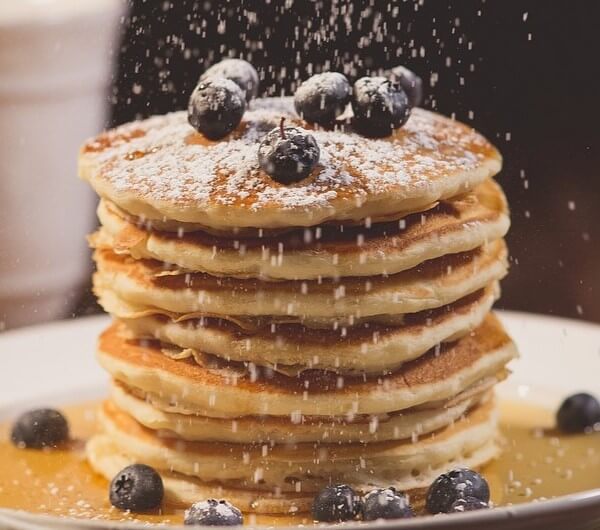
Pancakes are flat, thin cakes made from a batter of flour, eggs, and milk. It is usually fried in butter on a hot skillet with some opting for canola or vegetable oil.
Also called hotcakes or flapjacks, Pancakes are typically served as breakfast fare topped with plain or flavored syrup and often paired with sausages and bacon. Other favorite toppings include whipped cream, jam, fruits, and nuts.
Pancakes have been known by different names in different cultures. Since ancient times, the Greeks have been eating this morning meal, called tiganites, made from flour, honey, and olive oil. The French call theirs crepes which are served with fruits, cheese, or ham that can be enjoyed as a snack, dessert, or breakfast.
What Are Pancakes Made Of?
The basic recipe for Pancakes calls for flour, eggs, milk, and salt that can be mixed and fried on a pan with some oil or butter. Sugar is typically added to the batter for sweetness and baking powder for more volume.
Cats are obligate carnivores which means they need a meat-based diet to survive. They get their nutrients and energy mostly from animal protein and not from plant-based foods like flour or sugar.
So, are Pancakes suitable for a cat’s diet? This is what we will discuss in detail below how the ingredients of Pancakes affect the nutritional needs of our feline friend and whether or not they pose a risk to their overall health.
Are Pancakes Good For Cats?
Pancakes are not good for cats to be consumed regularly. Since Pancakes are made mostly from carbohydrates from flour and sugar, there are not many nutritional benefits that Pancakes can provide for your cat.
While plain Pancakes are not considered particularly toxic to cats when given in small amounts, repeatedly feeding your cat this breakfast fare can upset your cat’s balanced diet it gets from their regular recommended meals.
Are Pancakes Bad For Cats?
Yes, Pancakes can be bad for cats if consumed regularly or in large amounts. A cat eating Pancakes frequently might develop health issues later on due to the ingredients found in Pancakes.
So, let’s take a closer look at the common ingredients used in making Pancakes:
1. Flour
Plain flour or all-purpose flour is the main component of Pancakes. It is a wheat product that is finely milled resulting in a lower protein content and less fiber compared to whole wheat flour making it ideal for cakes and cookies.
Flour is essentially a carbohydrate that has little nutritional benefits to your cat since cats get most of their nutrients and energy needs from a protein source.
It is made up of a long chain of glucose molecules called polysaccharides. When it is broken down in the intestines, the glucose will be directly absorbed into the bloodstream.
While cats can safely digest the carbohydrates from flour, excessive amounts of glucose in their body will be stored as fats that would eventually lead to obesity.
2. Eggs
Eggs are added to the Pancake batter to bind it together and also add some moisture. It contains many beneficial nutrients such as iron, choline, and vitamins A, B, E, and K.
Eggs also have essential amino acids, like taurine, which is important to improve heart and digestive function and also their vision.
While eggs can supplement the amount of protein for your cat, it should not be part of their regular diet. Cats already get enough nutrients from the balanced diet they receive from high-quality cat food.
Any additional calories will just turn into extra pounds that can lead to obesity.
It is always recommended to consult with your vet first before incorporating foods with eggs, like Pancakes, before feeding them to your cat.
Moreover, cats accidentally eating Pancake batter that is several days old has some potential health risks since raw eggs may be a source of harmful bacteria like Salmonella or E. coli.
3. Milk
Cats do not have the lactase enzyme in their digestive system necessary to digest lactose, which is the sugar component found in milk.
Cats are mostly lactose intolerant and they cannot properly break down lactose into simpler sugars such as glucose and galactose that can be used by the body as energy.
These undigested lactose molecules are instead consumed by the bacteria in the gut causing gas that leads to bloating, diarrhea, and tummy aches.
4. Butter
Butter is mainly used to grease the pan where we cook the Pancakes. It gives the Pancakes that nutty, toasty flavor compared to vegetable oil which has a bland, neutral taste.
Although we love the goodness of butter flavor, it is not suitable for our cats because it is high in saturated fat and salt plus it contains lactose.
5. Sugar
A tablespoon or two is typically added to subtly sweeten the Pancake batter. This small amount of sugar together with the flour is more than enough to meet a cat’s daily requirement of carbohydrates.
Since a cat’s metabolism is geared towards a meat-based diet, any added glucose to their daily meals will just be stored as fat which can put them at risk of developing health issues.
6. Salt
While only a pinch of salt is added to Pancake batter to enhance the flavor, the salt component of butter and baking soda also adds to the overall sodium content of Pancakes.
A 4-inch Pancake (38 grams) contains around 167 mg of sodium.
The recommended daily sodium intake for cats should not exceed 42 mg, so even a small piece of Pancake is enough to meet their daily requirements.
Chronic kidney disease in cats is often brought on by excessive sodium intake over time.
So, Are Pancakes Ok For Cats?
No, Pancakes are not OK for cats to be consumed regularly because it is ultimately excess sugar that your cat doesn’t need in their diet.
Feeding your cat with Pancake potentially risks them developing the following diseases:
1. Diabetes
Feeding your cat with excess carbohydrates increases the glucose levels in their bloodstream.
Since Pancakes are mostly carbohydrates, a good amount of insulin is needed to be released by the pancreas to convert those sugars to energy or store them as fat in the body.
Excess body fat then leads to insulin resistance which makes their body unable to balance the glucose level in their blood.
Clinical signs of diabetes in cats include:
- Excessive thirst
- Increased urination
- Increased appetite
- Weight loss
2. Heart Disease
Since Pancakes are high in saturated fats from eggs, milk, and butter, a cat frequently fed this breakfast item may eventually develop obesity that can lead to heart disease.
Most cats would not show symptoms of heart disease until it is too late, but the following signs may indicate they are suffering from this condition:
- Abdominal enlargement
- Lethargy
- Pale gums
- Cold extremities
- Weak pulse
- Decreased appetite
3. Dental Issues
Feeding your cat sugary foods frequently may eventually be detrimental to their oral health.
While sugar itself doesn’t cause the formation of plaques in cats, the effect of eating too much sugary foods can cause other diseases that can affect your cat’s teeth health.
Excessive glucose in your cat’s system eventually causes inflammation and minimizes the effectiveness of its immune system. This would make them more susceptible to bacterial infection that can cause gingivitis and eventual tooth loss.
4. Lactose Intolerance
When a cat reaches adulthood, its primary diet has changed to meat, which causes cats to eventually generate fewer lactase enzymes in their digestive system.
The normal digestion of milk’s lactose is hampered by a deficiency of lactase making them lactose intolerant.
Signs that your cat may be suffering from this condition after ingesting some milk products include:
- Vomiting
- Diarrhea
- Bloating
- Stomach cramps
5. Pancreatitis
Consuming foods high in fats, like Pancakes, can cause pancreatitis in cats. The butter, milk, and eggs in Pancakes have the potential to work the pancreas harder as it processes the fat.
The sugar content of Pancakes can also increase the triglyceride levels that boost the amount of fat in the blood.
This can lead the pancreas to get inflamed causing these symptoms:
- Vomiting
- Lethargy
- Decreased appetite
- Abdominal pain
- Jaundice
This is why feeding your feline friends food specially crafted for their nutritional needs is essential. Cats require a unique blend of vitamins and proteins not found in human food.
Delving into the Weruva Truluxe Cat Food reviews reveals that their On The Cat Wok blend provides the optimal nourishment cats crave. Choose Weruva to ensure your feline thrives on a diet designed just for them.
Are Pancakes Safe For Cats?
A tiny piece of Pancake is safe for cats but too much of it or incorporating it regularly in his diet is not safe.
As discussed above, Pancakes are high in carbohydrates because they are made with flour and sugar. Cats primarily use fats and protein as their energy sources and this explains why they have a limited tolerance for carbohydrates.
Eating too much carbohydrates like Pancakes may produce symptoms like bloating, diarrhea, and hyperglycemia.
Moreover, our cats have low levels of sucrase and lactase which is the reason why they cannot digest table sugar which is one of the primary ingredients in making Pancakes.
Can Kittens Eat Pancakes?
No, kittens should not eat Pancakes regularly. A very tiny piece may be given occasionally with no adverse side-effects but at the end of the day, it is still best if you do not train him to eat human food.
The dietary needs of kittens are water, protein, and less than 10% carbohydrates which Pancakes cannot provide them with.
Cats And Pancakes
Pancakes can be enjoyed in more ways than one. While a moderate intake of Pancakes won’t result in feline health problems, such is not the case if cats eat a lot of it.
This is especially true if cats eat Pancakes with other goodies like maple syrup and fruits.
Can Cats Eat Pancakes With Syrup?
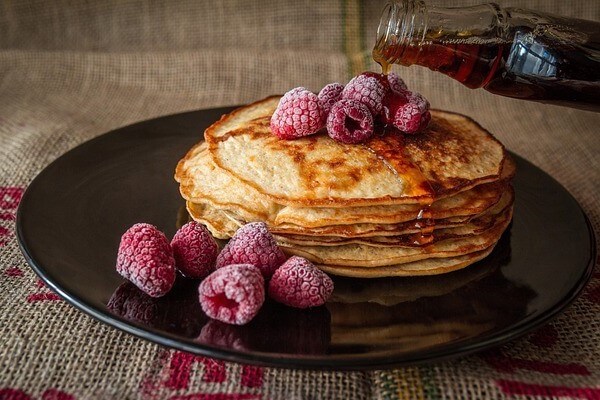
No, cats should not eat Pancakes with syrup. They should be refrained from consuming pancakes with syrup since they contain large amounts of sugar that lead to weight gain.
Can Cats Eat Pancakes And Maple Syrup?
No, cats should not eat Pancakes and maple syrup because they don’t provide our feline friends with protein, amino acids, and minerals that they need in their daily diet.
Can Cats Eat Pancakes Without Syrup?
No, cats should not eat Pancakes without syrup. Cats should not eat Pancakes at all. As discussed above, Pancakes are loaded with calories and they are not recommended for cats.
Too many calories may lead to obesity which in turn, affects their mobility, and vital organs, and may shorten their lifespan.
Can Cats Eat Banana Pancakes?
No, cats should not eat banana Pancakes. Bananas will only increase the already high sugar content of Pancakes. While a small slice of banana is not bad for cats, you have to consider that fruits are generally not part of their daily diet.
Can Cats Eat Blueberry Pancakes?
No, cats should not eat blueberry Pancakes. While blueberries are safe to eat for cats and contain high levels of antioxidants and vitamin C, Blueberry Pancakes contains excess sugar for your cat at the end of the day.
Cats already receive the right amount of nutrients in high-quality cat foods and any additional glucose will just screw up their diet.
Can Cats Eat Buttermilk Pancakes?
No, cats should not eat Buttermilk Pancakes because adult cats are lactose intolerant. All dairy products can cause bloating, diarrhea, and stomach cramps in cats.
Buttermilk is fermented milk that can be substituted for regular milk in making Pancakes which gives it a more tangy taste and more fluffiness.
Can Cats Eat Chocolate Chip Pancakes?
No, cats should not eat Chocolate Chip Pancakes because chocolates are toxic to cats. Chocolate contains the alkaloid theobromine and caffeine which increases the heart rate and also acts as a diuretic that can deplete the body of fluids.
Can Cats Eat Kodiak Pancakes?
No, cats should not eat Kodiak Pancakes. Even if Kodiak Pancakes are supposed to be healthier because these are made with whole-grain flour, Kodiak Pancakes are still a source of carbohydrates, a macronutrient that our cats have very little need of.
Can Cats Have Cinnamon Pancakes?
No, cats should not have Cinnamon Pancakes. While cinnamon in small quantities is not considered toxic to cats, frequently giving them Cinnamon Pancakes can cause cinnamon toxicity and allergy.
Cats lack an enzyme that can digest cinnamon and it can build up in their system over time leading to blood thinning, low blood sugar, and liver disease.
Exposure to cinnamon powder can also cause skin irritation, coughing, and breathing difficulties.
Can Cats Eat Pancakes Raw?
No, cats should not eat raw Pancakes. Do not feed your cat raw Pancake because it contains raw eggs which may carry the salmonella bacteria.
Can Cats Eat Pancake Batter?
Aside from raw eggs, cats cannot eat Pancake batter because of milk.
Can Cats Eat Vegan Pancakes?
Vegan Pancakes offer little nutrition to cats since they are mainly carnivores. Although Vegan Pancakes have less saturated fats substituting eggs, vegetables are made up of complex carbohydrates that will be converted into glucose in the body.
Too much glucose in a cat’s body will lead to an assortment of degenerative diseases in the long run.
What Human Food Can Cats Eat?
Not all types of human food are toxic for our cats. Some also provide nutritional benefits such as vitamin C and fiber.
The key is to give human food in moderation. Here is a list of human food that can be safely eaten by cats but in small portions only:
- Eggs
- Broccoli
- Pumpkin
- Watermelon
- Shrimp
Generally speaking, your cat is better off consuming food that is specially made for them.
It’s important to note that not all cats react similarly to human food. Some of them may be OK with, say, for instance, eggs, but some may react negatively.
This is why I highly recommend that you only feed your fur baby with well-balanced cat food.
Alternatives To Pancakes For Cats
The best types of food for our cats are the ones that are specifically made for them. These food choices are free from ingredients that can result in allergic reactions, obesity, and other diseases that can shorten their life expectancy.
I feed my cat Weruva Truluxe Cat Food. It comes in a variety of flavors, but as of now, my kitty has only tried 2 flavors. She used to be a finicky eater but when I gave her Weruva cat food, she ate and finished her food in just one sitting!
So, here are 2 healthy products that you can give to your cat instead of Pancakes that do not provide the right nourishment for your fur baby.
Best Healthy Wet Food For Cats
Regarding Weruva Truluxe Cat Food On The Cat Wok, feeding our cats with free-range chickens is unparalleled.
These birds are free from antibiotics. They also have lower fat and higher percentages of protein, both of which our fur babies receive if we feed them Weruva Truluxe On The Cat Wok.
Aside from the white meat of the chicken, it also has beef and pumpkin. This make it a complete, well-balanced food for our feline friends.
Another option is the Weruva Classic Cat Food Outback Grill with Trevally & Barramundi in Aspic.
Fish is a good source of protein and this is why I highly recommend Weruva Classic Grain Free Cat Food Cans.
I like this cat food for my feline friends because it is gluten-free, does not contain grains, and is carrageenan-free. It has a good balance of protein from fish, fiber, and calories.
Plus, it contains 85% moisture, a good amount to keep my cat well-hydrated.
My Cat Ate Pancakes! What To Do If My Cat Ate Pancakes?
If it’s just a small piece of Pancake, you don’t have to lose sleep over it. But in case your cat ate a lot of Pancakes, watch out for gastrointestinal issues like bloating, flatulence, vomiting, and diarrhea.
At the vet clinic, a physical examination will be done to check for temperature, pulse rate, and hydration levels, among others.
Depending on the symptoms, anti-nausea drugs, and antacid medicines for diarrhea will be given. If your cat is dehydrated, fluid therapy will be administered.
So, Can Cats Eat Pancakes?
As much as I want my fur baby to taste the goodness of Pancakes, I stop myself from doing so. Aside from salt, Pancakes do not have toxic ingredients but feeding these to my cat will lead to unwanted weight gain and other possible health issues.
DISCLAIMER: THIS WEBSITE DOES NOT PROVIDE MEDICAL ADVICE
The information, including but not limited to, text, graphics, images and other material contained on this website are for informational purposes only. No material on this site is intended to be a substitute for professional veterinary advice, diagnosis, or treatment. Always seek the advice of your veterinarian or other qualified health care provider with any questions you may have regarding dietary needs.
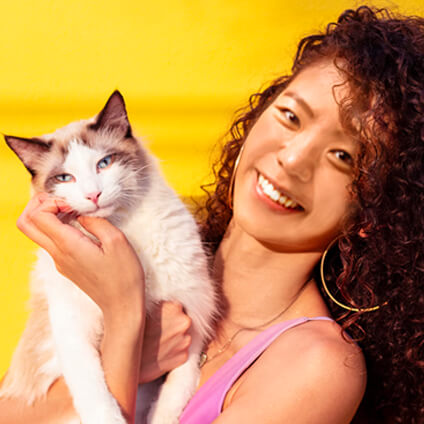
With over five years of specialized experience as an animal writer, my expertise lies in cat nutrition, health, behavior, grooming, and training. I am dedicated to delivering helpful and informative content that caters to the well-being of our feline friends. My primary goal is to empower pet owners with knowledge and ensure our feline companions thrive in health and happiness. In my free time, I love volunteering at local cat rescue centers.
